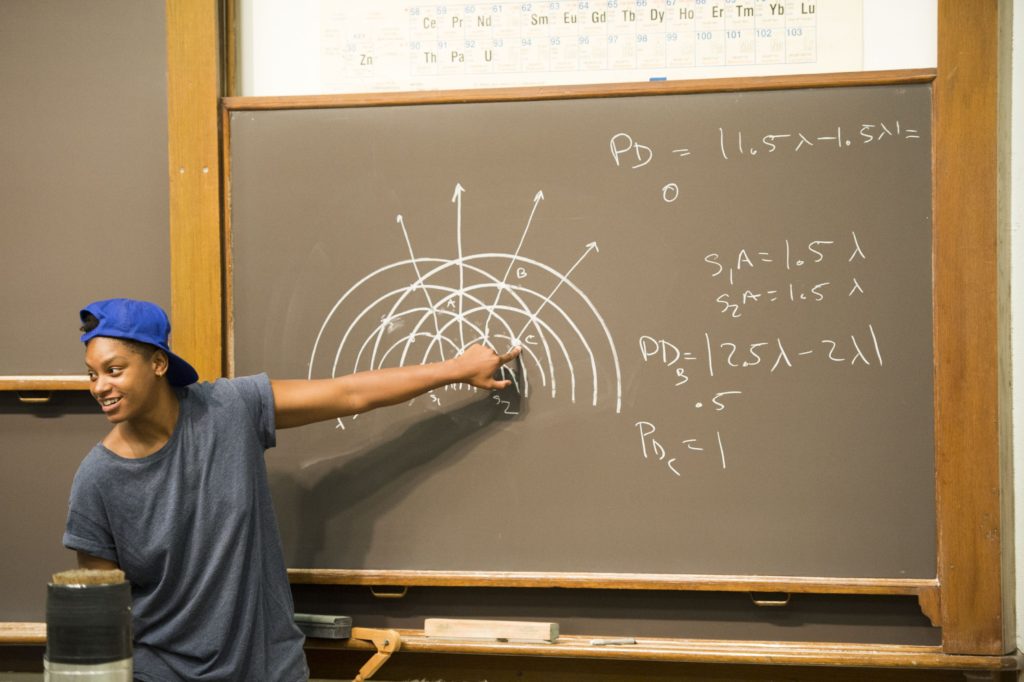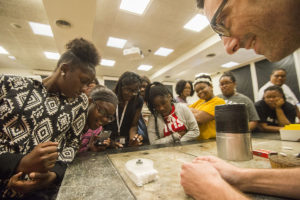
As a community college student in Pittsburgh, Tasha Jordan, a graduate student at Washington University in St. Louis, was frequently the only African American and the only woman in her advanced math and science classes.
“I wasn’t supposed to like math because I was a black girl, but I would dream square roots,” said Jordan, a student in the Brown School working toward dual masters degrees in social work and education. “It could feel isolating, but math was what I loved.”
That’s why Jordan is helping Washington University’s Institute for School Partnership educate the next generation of African-American girls through the Girls Inc. Eureka! program, a five-year initiative that focuses on science, technology, engineering and math.
For six weeks this summer, Jordan and other Washington University students, faculty and alumni are leading labs and workshops in a program called Eureka! for 14 talented high school sophomores from across the region. The days are long and the work is hard, but the students are thriving.
“They are more than a cohort, they are a sisterhood,” Jordan said.
On this day, the girls are competing as teams, computing the surface area and volume of various shapes. Ta’mya Cummings, a straight-A student from McCluer High School in Ferguson, Mo., puts her team on top when she is the first to list the square roots of numbers one through 20.
“My friends ask me why I would want to spend my summers doing math but, to me, this is fun,” said Cummings, who aspires to be a mechanical engineer. “These people are my friends. I can be myself around them.”
Sheretta Butler-Barnes, assistant professor at the Brown School, and her husband, David Barnes, a math educator and PhD-candidate in math education at Washington University, helped develop the program’s culturally responsive curriculum.
Butler-Barnes’ research shows student achievement and confidence increase when STEM instruction is connected to both a student’s lived experience and cultural heritage. That’s why she has integrated history into the learning, introducing students to African-American scientists such as Katherine Johnson, the NASA physicist and mathematician who helped put a man on the moon.
“You don’t teach them differently — math is math — but what you can do is tell them stories of people like them who have made strides in male-dominated fields,” Butler-Barnes said. “You can’t be what you don’t see.”

Tawana Hughes manages the Eureka! program for the local Girls Inc. affiliate. As a veteran math teacher, teaching coach and school principal, she knows full well of the challenges girls face in the classroom. Study after study shows teachers call on boys more than girls, and that societal forces discourage women from pursuing STEM studies. The result: women, especially African-American women, are underrepresented in high-paying STEM jobs.
“I explain to the students that it is our obligation to change those statistics,” Hughes said. “Men are not making more money because they are smarter; they are making more money because they chose the careers that pay more.”
Girls Inc. President and CEO Cheryl Jones helped launch the St. Louis’ Eureka! program two years ago; there are 84 Eureka affiliates in America and Canada. Local participants spend their first two summers at the University of Missouri-St. Louis and Maryville University, respectively, before arriving at Washington University. Hughes places the students in paid STEM-related internships for the final two summers.
“To be here at one of the best colleges in the nation motivates and inspires them,” Hughes said. “But most importantly, they are meeting women who look like them and have achieved great success in their careers. That can make a huge difference for a student.”